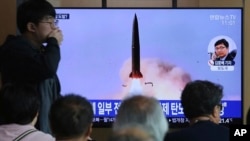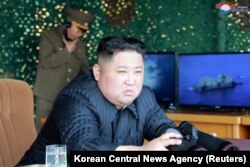North Korea's "strike drill" last week at which leader Kim Jong Un oversaw the launch of rockets and at least one short-range ballistic missile was "regular and self-defensive," the country's foreign ministry said on Wednesday.
"The recent drill conducted by our army is nothing more than part of the regular military training, and it has neither targeted anyone nor led to an aggravation of the situation in the region," an unidentified ministry spokesperson said in a statement to the state-run KCNA news agency.
Acting U.S. Defense Secretary Patrick Shanahan told a congressional hearing on Wednesday that North Korea launched "rockets and missiles," the first time the Pentagon has detailed what it believes Pyongyang fired.
Saturday's drill was the first test of a ballistic missile by North Korea since it launched a long-range intercontinental ballistic missile in November 2017.
It came in the wake of talks with the United States and South Korea stalling in February, and raised alarms in both countries, which have been seeking to entice the North into abandoning its nuclear weapons and ballistic missile programs.
Seoul responded on Saturday by calling on its northern neighbor to "stop acts that escalate military tension on the Korean Peninsula."
In a second statement carried by KCNA on Wednesday, a spokesman for the North Korean office in charge of military engagement with South Korea lashed out at Seoul over any suggestion that the rocket drills had violated an inter-Korean agreement aimed at reducing military tension.
"The South Korean military should take a close look at the inter Korean military agreement and recall what it has done itself before talking nonsense that it was against the spirit of the agreement," the spokesperson said, according to KCNA.
North Korea critical of U.S. test
The second statement also criticized last week's test of a U.S. Minuteman intercontinental ballistic missile (ICBM) by the U.S. Air Force out of California over the Pacific, saying South Korea was in no position to criticize North Korea.
"The South Korean military has no right to say a word to its fellow countrymen when it acted like a mute who ate honey when the United States fired a Minuteman ICBM which threatens us," the military spokesman said.
According to a subsequent English-language report on KCNA, the spokesman also took aim at Seoul for staging "provocative" combined air drills with the United States and for allowing the stationing of a U.S. THAAD anti-missile system on its territory.
It also appeared to hint at the possibility of more weapons tests, saying: "The south Korean military were astonished by the recent strike drill. It might fall into a swoon to see a strike drill involving more powerful cutting-edge weapons."
U.S. President Donald Trump, who has met with Kim twice, said on Saturday he was still confident he could have a deal with Kim, and U.S. and South Korean officials have subsequently played down last week's tests.
North Korea's foreign ministry statement hit back at "spiteful remarks" about the tests from unnamed critics, warning that "baseless allegations" might "produce a result of driving us to the direction which neither we nor they want to see at all."
‘Note of warning'
The ministry spokesperson said there was a double standard, with South Korea and the United States carrying out military drills with little criticism.
"Only our regular and self-defensive military drill is branded as provocative, and this is an undisguised manifestation of the attempt to press the gradual disarmament of our state and finally invade us," the spokesperson said. "We think this is very much unpleasant and regrettable, and we sound a note of warning."
After meeting with Kim for the first time in June last year, Trump abruptly announced he was cancelling all large-scale military exercises with South Korea. Smaller exercises have continued, however, drawing regular criticism from Pyongyang.
North Korea had maintained a freeze in nuclear and ballistic missiles testing in place since 2017, a fact Trump has repeatedly pointed out as an important achievement from his engagement with Pyongyang.
Denuclearisation talks with North Korea have stalled, however, after Trump and Kim met in February for a second summit but failed to reach an agreement.
North Korea balked at the extent of the demands made by American negotiators, and Trump said he ended the summit early because Kim was asking for nearly all major sanctions to be lifted while offering little in return.
The U.S. special envoy for North Korea, Stephen Biegun, arrived in Seoul on Wednesday for talks with South Korean officials.
He did not respond to questions from journalists, but his agenda is expected to include the missile test, as well as other aspects of talks with North Korea, including plans for possible humanitarian aid.














